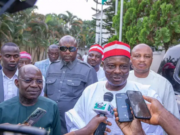Speaker of the House of Representatives, Hon. Tajudeen Abbas, on Monday, rejected repeated calls for the adoption of part-time legislators as part of proposed political reforms in Nigeria.
Speaking in Abuja at the opening of the one-day National Dialogue on a Home-Grown Parliamentary System of Government, Abbas argued that while the conversation around reform is timely, part-time legislators could undermine the serious responsibilities of lawmakers.
Abbas explained that the current advocacy for part-time legislators could diminish the critical role lawmakers play in lawmaking, representation, and oversight.
“A legislator’s work demands full-time commitment,” he stated, stressing that governance is a serious business that requires attention, accountability, and dedication.
The Speaker also discussed the broader issue of reform, noting that while there are ongoing debates about a unicameral legislature, Nigeria’s vast diversity makes a bicameral system essential for ensuring balanced representation across regions and ethnic groups.
He emphasized that any structural changes must be carefully considered to avoid unintended consequences for the country’s complex socio-political landscape.
“As we explore reforms, we must recognize that Nigeria’s unique challenges demand a governance model grounded in the country’s realities and values. A home-grown system should reflect not just procedural aspects, but the values, goals, and cultural nuances of the people it serves.”
He also highlighted the National Assembly’s commitment to professional development and capacity building for its members, committees, and support staff.
“We are focused on building resilience and professionalism through continuous training to better serve Nigerians,” Abbas added.
The event, which was attended by various stakeholders, also featured speeches from experts critical of the current American-style presidential democracy in Nigeria.
Dr. Usman Bugaje, a former presidential aide and guest speaker at the dialogue, lamented the worsening poverty, escalating insecurity, and widespread corruption that have persisted under the presidential system over the last 25 years.
He argued that while the country had experienced some peace in the early years of the Fourth Republic, the situation had deteriorated drastically with each passing decade.
“We’ve seen deepening poverty, rising insecurity, and pervasive corruption that continues to undermine the political system. These issues are fundamental breaches of democratic practices and contribute to a growing crisis in our democracy.”
Other contributors to the dialogue, including the former National Secretary of the defunct Action Congress, blamed Nigeria’s parliament for being ineffective.
They argued that the legislative body had become largely a rubber stamp, failing to play its constitutional role in holding the executive accountable.
The speaker called for a reinvention of Nigeria’s politics, suggesting that continuing to borrow systems from other countries could only lead to further failure.
Professor Ango Abdullahi, Chairman of the occasion and convener of the Northern Elders Forum, also critiqued Nigeria’s adoption of the American presidential system.
He contended that the system, which has been in place for 24 years, had not delivered the expected benefits for the Nigerian people.
Abdullahi called for the exploration of alternative systems of governance that are better suited to Nigeria’s history, traditions, and social realities.
“The American presidential system was a mistake for Nigeria. Our situation has worsened under this system, and it’s clear that we need to adopt a new approach, one that reflects our own history and experience.”
Hon. Abdussamad Dasuki echoed similar concerns, stressing that the presidential system had failed to deliver the democracy Nigeria’s founders had envisioned.
He argued that it was time to craft a new system that addresses the country’s systemic problems, emphasizing the need for a home-grown solution, driven by inclusive dialogue between different generations of Nigerians.
Former Minister of Interior, Ogbeni Rauf Aregbesola, also spoke at the event, highlighting the importance of accountability in any system of government.
He warned that without strict measures for accountability, no system would be able to resolve Nigeria’s current challenges of poverty, insecurity, and corruption.
The dialogue ended with a consensus that Nigeria needs a parliamentary system rooted in its unique political and cultural realities, but that reform must be approached with caution and careful consideration to avoid repeating past mistakes.

















